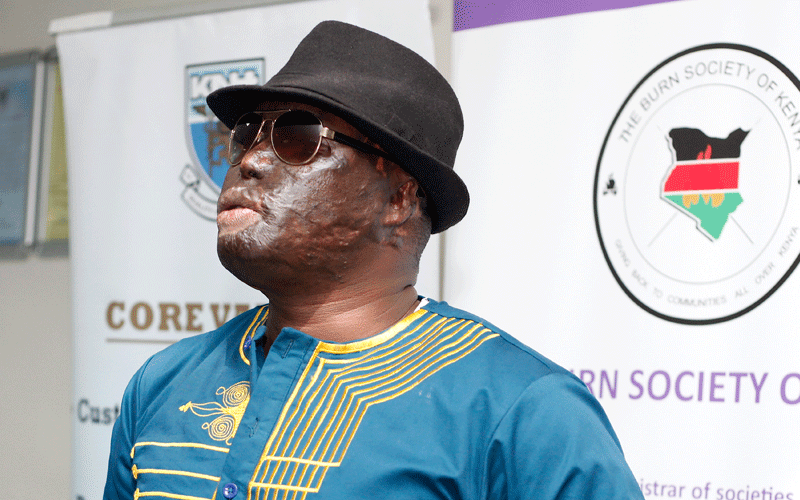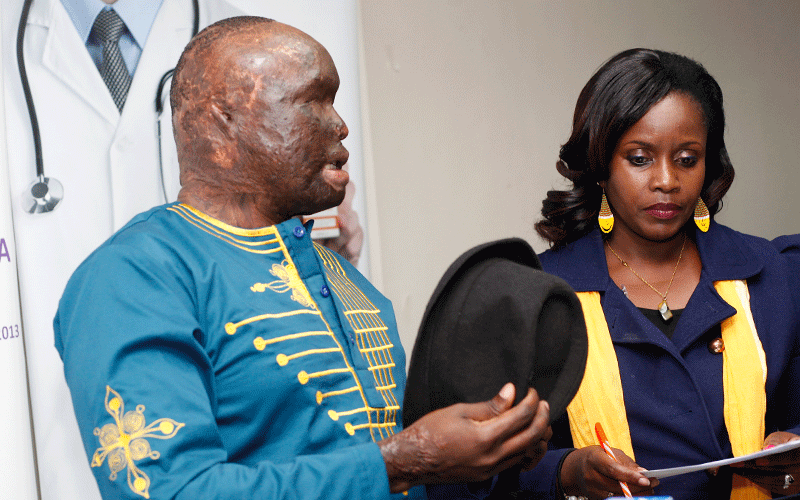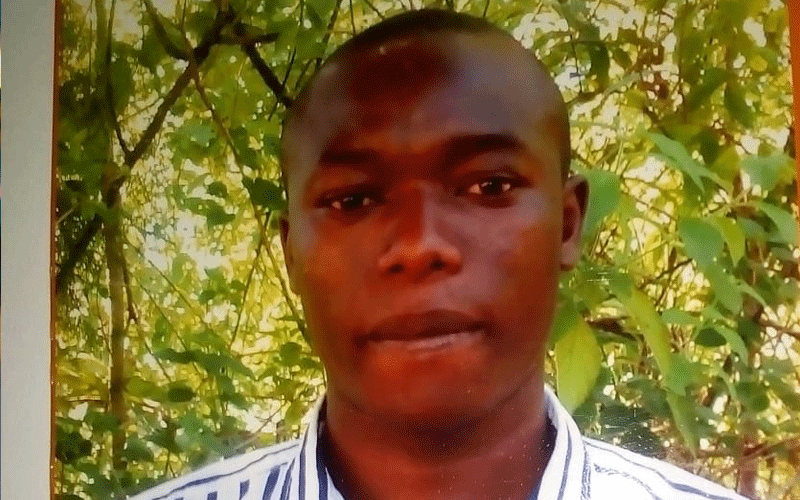Cop breaking silence on violence against men

Evelyn Makena @evemake_g
It has been seven years since Dan Matakaya, a police officer suffered an acid attack leaving him physically and emotionally scarred.
The incident left him with a visual impairment, his face disfigured and with a blocked nostril.
As cases of domestic violence soar in the wake of Covid-19, they send shivers down Dan’s spine.
He vividly recalls the morning of September 21, 2013 when he was 26 years old.
He had fallen asleep in his house at a Kisii police station after returning from night duty at 5.30am.
Beside him lay his wife, who was visiting him at his workstation with plans of cutting short her stay on the fateful day.
“She had packed her bags ready to return to Nakuru, where she was working and staying at the time,” says Dan.
He was woken up by a stinging pain on his eyes and a burning sensation on his face.
When he sprung to his feet in an attempt to reach out for water, he was hit by an electric shock.
His wife of one year, had doused his face with concentrated Sulphiric acid, poured water on the floor, connected it to a power source to generate electric shock and then fled.
“The idea was to have me electrocuted after she burnt me with acid,” he says. He screamed for help and was rushed to hospital by his colleagues.
Seven years after the ordeal, Dan is helping male victims of domestic violence find psychological healing.
His voice lowers as he describes the series of events that led to the attack. He met his wife while working in Embu in 2009.
At the time, the fifth born in a family of nine had just completed training at Kiganjo Police College and received his first posting.
The two met at the police station as she was recording a statement on a relative’s child neglect case.

Her calm demeanor, honesty and humility, Dan says, are what attracted him to her.
They became instant friends and begun dating before getting married in February 2012.
At the time of moving in together, his wife was about three months pregnant. Theirs, Dan remembers was a peaceful marriage.
They had disagreements like any other couple, but quickly resolved them. In October the same year, the couple welcomed their first child.
But even before the two could settle into parenthood, Dan was transferred to a police station in Kisii, a month after the birth of their child.
Unfortunate visit
Since the baby was young, the two agreed that his wife would remain with her family in Embu and join Dan in Kisii after he had settled.
“We agreed that I would be visiting them on a regular basis,” he says. The family united in Kisii in February 2013 briefly before his wife went to Mwea to take up a job.
In May 2013, their child was admitted in a hospital in Mwea after being diagnosed with meningitis and pneumonia.
“Unfortunately, after one week of admission, the child passed on. We were devastated,” says Dan.

After the child’s burial, he returned to work in Kisii and his wife moved to Nakuru for work as they both embarked on a journey of healing.
Three days before the acid attack in September 2013, Dan’s wife had paid him a visit at his work station.
The two got into a disagreement with the wife demanding to carry all the baby’s belongings and take them to Nakuru.
“For me, I did not see the need for her to go with the belongings because that was our house,” says Dan.
His wife, Dan says was a quiet woman and at times it would be difficult to really tell what was going through her mind.
When I saw she was quiet after the argument, I stormed from the house and went out.
I called her mother notified her about the argument and she advised my wife to go home soonest possible,” he says.
On the day she was meant to leave, she attacked him with acid and fled. She would later surrender to authorities two days after the incident.
With multiple medical procedures behind him, Dan notes that the damage caused by the attack is irreversible.
The medical procedures have helped restore some functionality and prevent infections.
After the accident, Dan was admitted at Kenyatta National Hospital’s burn unit for six months receiving comprehensive treatment.
Recovery journey
During this time, he had continuously prayed that his sight, which he lost days after the accident would be restored.
The doctors, however, said he would live with visual impairment. For the next one and half years after being discharged from Kenyatta in February 2014, Dan was put under home care and spent his time in and out of hospital for different surgeries.
In 2016, he went for rehabilitation at the Kenya Society for the blind where he learnt braille, mobility and basic things such as cooking to help him regain independence.
He returned to work in 2017 and was transferred from Kisii to Industrial Area Police Station.
The past few years have been a journey of recovery both physically and psychologically for Dan.
After few failed attempts to commit suicide and being consumed with revenge against his ex-wife, Dan says he finally decided to forgive her. “Sometime back, I chose to forgive her.
I actually called her and told her that I had forgiven her. My heart has been filled with so much peace ever since,” he says.
His wife was charged with the incident, but is out on bond as the case is still in court.
The ordeal, opened up his eyes to the reality of domestic violence against men. Dan remembers the numerous people he met at the burns unit who had all been attacked by intimate partners.
During his recovery, numerous people approached him asking for advise on how to overcome domestic violence in marriage and relationships.
That prompted Dan to set up a foundation registered in 2019. Dan Shishie Foundation offers counselling services to men affected by domestic violence.
“We want to give men a platform to talk. In fact, society has labelled men as perpetrators, but they are also victims of domestic violence,” he says.












